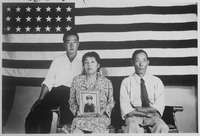No-No Boy

(publ. Charles E. Tuttle)
No-No Boy is a 1957 novel, and the only novel published by Japanese American writer John Okada. Set in Seattle, Washington in 1946 and written in the voice of an omniscient narrator who frequently blends into the voice of the protagonist, it is about one Japanese American in the aftermath of the incarceration during World War II.
Plot
Ichiro Yamada, a Japanese American male and former student at the University of Washington, returns home in 1946 to a Japanese enclave in Seattle, Washington. He has spent two years in a Japanese internment camp and two years in federal prison for refusing to fight for the U.S. in World War II. Now home, Ichiro struggles with his parents for embracing American customs and values and he faces ostracism from the Japanese community for refusing to join the U.S. military and fight Japan when many in his community did.
During the war, the U.S. government grew paranoid that ethnically Japanese residents who chose not to fight were loyal to Japan. In the spring of 1942, the government began removing Japanese and Japanese American families from their homes and sending them to live in remote internment camps. The government also asked Japanese Americans to answer questionnaires, where affirmative answers signaled unwavering loyalty to the U.S. For varied reasons, many respondents answered "no" to questions 27 and 28 and became known as "No-No Boys." Perceived as disloyal to the U.S. but not fully Japanese, Ichiro struggles to find his path. Through Ichiro's story, Okada examines what it means to be American in a post-war city whose nonwhite communities are struggling to find their places.
Background
The epithet 'no-no boy' came from two questions on the Leave Clearance Application Form, also known as the "loyalty questionnaire," administered to interned Japanese Americans in 1943. Some young male internees answered "no" to one or both of these questions:
- "Are you willing to serve in the armed forces of the United States on combat duty wherever ordered?"
- "Will you swear unqualified allegiance to the United States of America and faithfully defend the United States from any or all attack by foreign or domestic forces, and forswear any form of allegiance or obedience to the Japanese emperor, to any other foreign government, power or organization?"
Both questions were confusing to many respondents. Regarding the first, some respondents thought that by answering yes, they were signing up for combat duty, while others, given their forced removal and incarceration, said no to resist the draft. Regarding the second, to many respondents, most of whom were American citizens, it implied that the respondent had already sworn allegiance to the Japanese emperor. They saw the second question as a trap, and rejected the premise by answering no. Afterwards, all who answered "no" to one or both questions, or who gave an affirmative answer but qualified it with statements like, "I'll serve in the military after my family is freed," were sent to the Tule Lake Segregation Center.[1] Approximately 300 young men would serve time in federal prison for refusing to join the military from camp.[2][3]
The basic plot is not autobiographical. Okada, a Seattlite like his protagonist, served in the U.S. military himself. The novel was published in 1957 and remained obscure until much later. He died prematurely at age 47 in 1971. A few years later, two young Asian American men heard of Okada and his novel, and resolved to revive interest in the novel. With the cooperation of Okada's widow, they had it republished in 1976, and there was a second printing in 1977. Since that time, it has become a staple of college assigned reading.
Content of the novel
Although a crucial part of the novel's setting is the injustice of the internment of Japanese Americans, the novel is not a polemic about that event. Ichiro's turmoil during the novel also has much to do with rejecting his mother, whose personality and worldviews he despises and resents. His dissatisfaction with her is personal, going beyond her stance on the war. In chapter 1, it is disclosed that his mother and at least one of her women friends are loyal to Japan, refuse to believe the news that Japan lost the war, and are eagerly awaiting the arrival of Japanese warships in Seattle. They even refuse to accept the evidence of photos they have seen of the cities of Hiroshima and Nagasaki after the atomic bombings. These attitudes antagonize Ichiro and other Japanese Americans.
2010 play adaptation
The novel was adapted as a stage play of the same title by Ken Narasaki. The play had its world premiere on March 26, 2010 at the Miles Memorial Playhouse in Santa Monica, California.[4]
References
- ↑ Cherstin Lyon. "Loyalty questionnaire," Densho Encyclopedia 19 March 2013 (accessed 9 May 2014).
- ↑ Eric Muller. "Draft resistance," Densho Encyclopedia 10 June 2013 (accessed 9 May 2014)
- ↑ Annie Nakao. "A Unique Tale of WWII Resistance: Japanese American Internees Refused Draft," San Francisco Chronicle 26 Oct 2001 (accessed 9 May 2014)
- ↑ announced in Los Angeles Daily News online
External links
- Introduction to a conversation on John Okada’s No-No Boy
- Amazon.com reference to No-No Boy
- Official site of the play, No-No Boy adapted by Ken Narasaki
- "No-no boys," Brian Niiya, Densho Encyclopedia.
